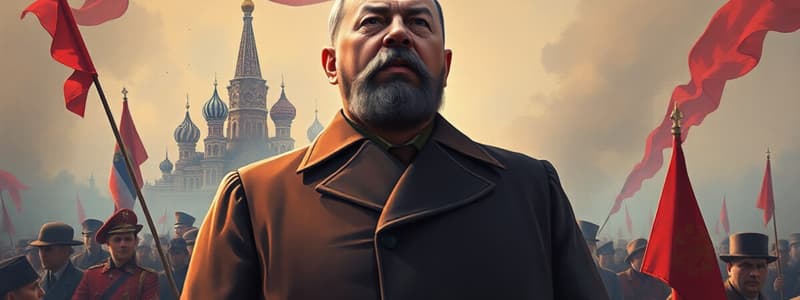Podcast
Questions and Answers
What was one of the main causes of the widespread discontent among Russian soldiers and civilians before the February Revolution?
What was one of the main causes of the widespread discontent among Russian soldiers and civilians before the February Revolution?
- Increased production of ammunition
- Excessive military victories
- Inflation and hunger in the rear (correct)
- Shortage of experienced military leaders
What significant action did Emperor Nicholas II take on March 2, 1917?
What significant action did Emperor Nicholas II take on March 2, 1917?
- Abdicated the throne (correct)
- Declared war on Germany
- Established a constitutional monarchy
- Ordered the military to open fire on protesters
Who was the leader of the Bolsheviks during the October Revolution?
Who was the leader of the Bolsheviks during the October Revolution?
- Vladimir Ulyanov (correct)
- Alexander Kerensky
- Karl Marx
- Leon Trotsky
What was the primary slogan used by the Bolsheviks to gain support among the populace?
What was the primary slogan used by the Bolsheviks to gain support among the populace?
What was a key characteristic of the Provisional Government formed after the February Revolution?
What was a key characteristic of the Provisional Government formed after the February Revolution?
What did the Bolsheviks do immediately after seizing power in the October Revolution?
What did the Bolsheviks do immediately after seizing power in the October Revolution?
What role did the Cheka play in post-revolutionary Russia?
What role did the Cheka play in post-revolutionary Russia?
How did Lenin's views on the proletarian revolution differ from traditional Marxist views?
How did Lenin's views on the proletarian revolution differ from traditional Marxist views?
What action did Alexander Kerensky take within the Provisional Government?
What action did Alexander Kerensky take within the Provisional Government?
What term describes the authoritarian rule held by a single person or a small group, particularly relevant in the context of post-revolutionary Russia?
What term describes the authoritarian rule held by a single person or a small group, particularly relevant in the context of post-revolutionary Russia?
Flashcards
February Revolution
February Revolution
The 1917 uprising in Russia that led to Tsar Nicholas II's abdication and the establishment of a provisional government.
Provisional Government
Provisional Government
A temporary government formed after the February Revolution, promising reforms and a constitutional monarchy, but ultimately unable to address the nation's problems.
Soviet
Soviet
A council of workers, soldiers, and peasants formed during the revolution, offering an alternative form of political representation.
Bolsheviks
Bolsheviks
Signup and view all the flashcards
Lenin
Lenin
Signup and view all the flashcards
October Revolution
October Revolution
Signup and view all the flashcards
Dictatorship of the Proletariat
Dictatorship of the Proletariat
Signup and view all the flashcards
Cheka
Cheka
Signup and view all the flashcards
Rationing
Rationing
Signup and view all the flashcards
Terror
Terror
Signup and view all the flashcards
Study Notes
Russian Revolution (1917)
- The February Revolution (1917) marked the end of the Romanov dynasty after 300 years.
- Attempts at establishing a parliamentary regime in Russia lasted only a few months before another revolution.
- Lenin and his party capitalized on the collapse of the tsarist regime and the lack of a stable liberal democratic tradition to establish a dictatorship.
February Revolution (1917) and Provisional Government
- World War I was a heavy burden on Russia.
- Shortages of ammunition and supplies, inflation, famine and disorganization in the country caused widespread discontent.
- Thousands of workers staged a strike on January 9, 1917.
- The introduction of rationing and the dissolution of the Duma caused unrest to intensify.
- The Petrograd Garrison joined the strikers.
- Tsar Nicholas II abdicated on March 2, 1917.
- A new Provisional Government, led by Prince Lvov, was formed and recognised by Britain and France.
- The government declared policies like abolishing the death penalty, granting amnesty, freedom of speech and promising constitutional monarchy.
- Russia remained in the war despite the popular demand for peace.
The Soviets
- Discontented groups formed Soviets (councils) of workers, soldiers, and peasants.
- This alternative form of political representation, initially dominated by Socialist Revolutionaries and Mensheviks, emerged.
Lenin's Return and Bolshevik Revolution
- Lenin was sent back to Russia by the German government.
- His party gained significant support among workers and soldiers with slogans "Peace, Bread, and Land."
- The Bolsheviks orchestrated a coup led by the Petrograd Military Revolutionary Committee.
- The Provisional Government was overthrown on October 25, 1917 (November 7, New Style).
- Lenin issued decrees abolishing private property and calling for peace negotiations.
Aftermath of the October Revolution
- The Bolsheviks gained control of Moscow.
- Despite the lack of success in suppressing popular opposition, they were unable to prevent the elections for the Constituent Assembly.
- The Assembly was dismissed in January 1918.
- A new government was formed, marked by the abolition of aristocratic titles and privileges.
- A new secret police organisation - Cheka was established to combat dissent.
Dictatorship
- Dictatorship is a form of authoritarian government where power resides in one person or a small group.
- Dictators often suppress civil rights and liberties.
Bolshevism
- Bolshevism was the faction of the Russian revolutionary socialist movement advocating for violent revolution.
- Their ideology was complete destruction of liberal democracy.
- It aimed to install a dictatorship of the proletariat as a transition to communism.
Constituent Assembly
- The Constituent Assembly was an elected body representing the people.
- The Bolsheviks dissolved the assembly after they lost the election.
Studying That Suits You
Use AI to generate personalized quizzes and flashcards to suit your learning preferences.




